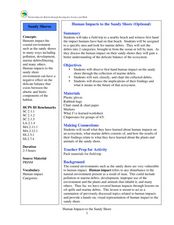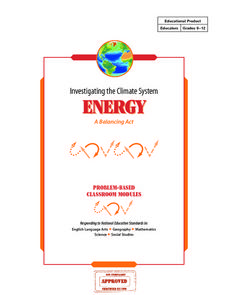Curated OER
Human Impacts to the Sandy Shore
Students investigate human impact on coastal environments. In this coastal environment instructional activity, students observe human impact on coastal environments. Students sort, classify, and chart marine debris collected on a local...
NOAA
Exploring Potential Human Impacts
Arctic sea ice reflects 80 percent of sunlight, striking it back into space; with sea ice melting, the world's oceans become warmer, which furthers global warming. These activities explore how humans are impacting ecosystems around the...
Curated OER
Nature and Fitness Trail
Students plan stations for a nature and fitness trail and construct an accompanying e-Book for extended descriptions at each station. Data on the human impact on the environment is gathered in this lesson.
Beyond Benign
Ecological Footprint
How does your lifestyle measure up in terms of your ecological footprint? Young ecologists examine their impact on the planet using an insightful online calculator. A short quiz asks users to rank the size of their homes, their energy...
Wild BC
Greenhouse Gas Guzzlers
Teams of six to eight players imagine that they are driving in a vehicle and collect balls that represent carbon dioxide emissions based on their different activities. "Greenhouse Gas Guzzler" cards tell teams how many balls to collect...
Intel
Biomes in Action
A STEM project-based learning lesson, number four in a series of 10, focuses on human impacts to biomes around the world. Groups work together as environmentalists to research a specific biome, investigating human impacts on it. From...
K20 LEARN
Ecosystems, Human Activity, And Interactions, Oh My!: Human/Environment Interaction
Word clouds about ecosystems hook learners into a lesson that explores Yellowstone wildlife. Young scientists create cause-and-effect relationships after examining data and recommend solutions to their observed problems. More data...
Chicago Botanic Garden
Are You Bigfoot?
Scholars independently explore several websites to calculate their ecological footprint. Using their new found knowledge, they answer six short-answer questions and take part in a grand conversation with their peers about how our...
Kenan Fellows
The Little Stuff Can Make a Big Difference
Great things come in small packages! What better way to illustrate this point than a week-long look at nanotechnology? Earth science scholars explore water quality issues through lab activities, then research new innovations in nanotech...
Florida Department of Environmental Protection
Water's Journey Expedition
Step into a scientist's shoes to go online and discover the Florida Springs Expedition, and participate in two activities focusing on how humans impact the environment. The first activity asks scholars to summarize the six dispatches at...
Core Knowledge Foundation
Taking Care of the Earth Tell It Again!™ Read-Aloud Anthology
A read-aloud anthology closely examines human impact on the Earth while boosting reading comprehension skills. Through stories, scholars examine the concepts of natural resources, pollution, garbage, and recycling and brainstorm ways to...
Curated OER
The Day After Tomorrow: How is the Density of Water Related to Climate Change and Global Warming?
Science learners simulate what happens when ice breaks up and floats on water and how increased pressure on ice causes it to melt faster. They view a clip from the movie, The Day After Tomorrow, and relate their lab activities to what...
Pulitzer Center
Extractive Industries
Here is a chance for environmental studies classes to take a critical look at crises occurring around the globe by reading articles and viewing video clips. The human activities under scrutiny are the extraction of oil, logging, and...
Curated OER
Ozone Hole - Changes in the Stratosphere
Halting the depletion of the hole in the ozone layer has been one of humanity's happy recoveries from previous damage done to the environment. Meteorology masters muse the Montreal Protocol and examine data on changes in the ozone....
Habitat Conservation Trust Foundation
Greenhouse Gas Game
You will need to gather a number of tokens, bags, and other various game components in order to incorporate this activity into your curriculum. Different tokens represent carbon dioxide, methane, and nitrous oxide. Printable 8.5"x11"...
Curated OER
Sustainable Marine Fisheries
Through a fishing simulation, environmentalists discover consequences of over fishing. Afterward, they discuss how the activity relates to the impact of real-life commercial fishing. They also consider sustainability in the fishing...
Prince William Network
Migration Headache
During this game, kids become migratory shorebirds and fly among wintering, nesting, and stopover habitats. If they do not arrive at a suitable habitat on time, they do not survive. Catastrophic events are periodically introduced that...
Curated OER
Effects of Ozone Depletion
Explore the causes of ozone depletion and the effect on plankton, algae, plants, amphibians, and humans. Learn how the Montreal Protocol has possibly helped reverse the decline of the ozone layer. Warning: photos of skin and eye damage...
Pulitzer Center
Exploring Downstream: Water Resources
The lack of clean water is a life-threatening plight for millions of people around the world. Through an extensive WebQuest, young environment or social studies classes compare our water availability to that of the cxitizens of Ethiopia,...
Pulitzer Center
The Global Water Crisis
High schoolers examine the "quiet crisis," the lack of clean water, by reading articles and viewing video clips. They discuss the situations in Ethiopia, Yemen, Kenya, and Nepal. There are two options for the lesson, but one of them...
Curated OER
Investigating the Climate System: Energy, A Balancing Act
Earth science explorers design an experiment to demonstrate that the albedo of a surface affects its temperature. They test to find out if moisture on the surface affects temperature. They discover whether or not concrete or asphalt heat...
Curated OER
What is Deforestation?
An overview of deforestation is the focus of this resource, which present the reader with a list of facts. Ten comprehension questions follow; learners can write their answers on a separate piece of paper. Have your environmental...
Curated OER
Wheel of Trouble
While teaching about endangered species, you can incorporate this activity as a take-home reminder of what is threatening the sea turtle population. It is one of those paper plate projects in which a wedge is cut out to reveal a picture...
Curated OER
The Human Footprint
In this environmental stewardship lesson, students view the human footprint website and then answer 3 short answer questions related to human impact on the earth.

























